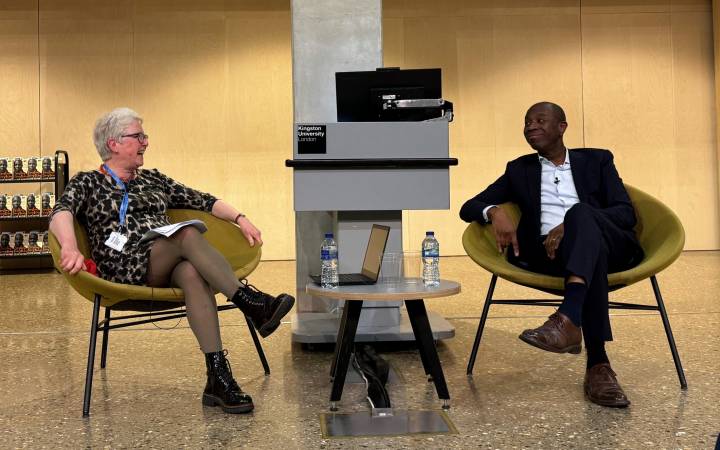Bosses should encourage office chats to improve team performance, Kingston University research reveals
Posted Friday 31 January 2020

Managers should encourage time for non-work chats as part of maintaining a productive team with strong working relationships, new research by a chartered psychologist from Kingston University London has revealed.
Dr Antonia Dietmann, who recently completed a Professional Doctorate in Occupational and Business Psychology at Kingston Business School, presented the findings of her thesis at the annual conference of the British Psychological Society's Division of Occupational Psychology in Stratford-upon-Avon.
Dr Dietmann, a senior HR leader in the Civil Service, said her research showed talking about life outside work helped colleagues build stronger bonds and enhanced collaboration. "Chatting about non-work topics such as family and hobbies is a simple way employees can build good working relationships with each other. However, office culture and some attitudes at work about the appropriateness of such 'chit chat' can mean they are not encouraged - and are even actively discouraged in work time."
"We wanted to assess how much a designated workplace activity designed to get people chatting would improve relationships, overall job performance, and also tackle some of those negative attitudes."
A total of 125 office workers were split into two groups and completed questionnaires relating to their work relationships, team performance, and the acceptability of chatting at work. The first group was given a conversation toolkit and told to chat with colleagues as much as possible over two weeks. The toolkit included a suggested topic list, ideas for good opportunities for social conversations at work, as well as resources to give encouragement and set goals. The second group was asked to complete a network map of relationships at work, but were not given any instructions about chatting at work. After two weeks both groups completed another questionnaire.
The results showed that workers in both groups reported significant improvements in the quality of their working relationships, work performance, and acceptance of chatting over the two-week period. However, the changes for the second group were generally smaller. Participants also believed non-work based chats at work were very important. Conversations didn't need to be long to make a difference and managers could set an example, Dr Dietmann said.
"Simple activities at work that help us chat more and focus on our relationships with colleagues can improve key outcomes at work. We all need the help and support of other people at work. These social chats can help smooth issues and be the basis for future collaboration."
"Some organisations will be concerned about time wasting. Our study, and earlier research, shows that people don't spend their whole time chatting - in fact these social conversations are short and only happen two to five times a day. Employees mainly talk about the job and tasks that need to be done.
"Just being exposed to more social conversations at work makes people accept them more and see their value. Managers should embrace and encourage social conversations at work, including role-modelling the importance of getting to know colleagues," Dr Dietmann added.
- Find out more about postgraduate courses at Kingston Business School.
Contact us
General enquiries:
Journalists only:
- Communications team
Tel: +44 (0)20 8417 3034
Email us



